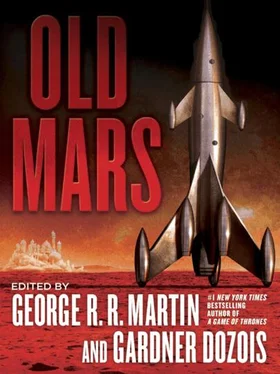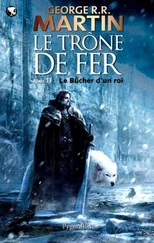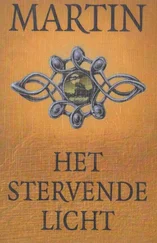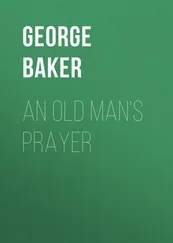This story shows that, even on Mars, family can be a strength and a refuge, and it can also be a claustrophobic, smothering trap—or, sometimes, both at once.
Written in Dust
MELINDA M. SNODGRASS
The best memory is that which forgets nothing but injuries. Write kindness in marble and write injuries in the dust .
—PERSIAN PROVERB
It was a festival day, and crowds strolled the jeweled streets. Overhead, delicate glass spires echoed the colors of the pavements below and scratched at the sky. The perfume of flowers both sharp and sweet coiled about her . A sticky-bun seller offered her one of his wares. The long face like a horse’s, but with faceted, insectoid eyes, nodded in acknowledgment as she sang her thanks. She was small compared with the crowds surrounding her. Tall, slim, swaying like dancing reeds, every word a note, every conversation a symphony. The living and the dead walking together . The inhabitants’ flowing attire seemed so much more comfortable than the binding suit she wore. She entered a temple, stood immersed in incense and the elegant curves of the abstract figures painted on the walls . The other worshippers turned to welcome her. For the first time in a long time, she was happy. She reached up and removed the bulky, confining helmet. Black hair tumbled onto her shoulders . But my hair is brown .
Matilda Michaelson-McKenzie (Tilda to her friends and family) awoke with a melody on her lips, but a melody that had little in common with any Earth tonal system, Western or otherwise.
She rose, sluiced off her face, and watched the water go swirling back into the recycling cisterns. This was the first time she’d had visions. Was that really what the Martians had looked like? Before, it had always just been sound without sight. And the memories seemed very human. Very explicable. Had she really been Miyako McKenzie?
Tilda was desperate to talk to someone about this latest development, but the only other person who heard the music was her father, Noel-Pa, and if they did talk, they would have to be careful. Tilda didn’t want to bring down Grandpa Stephen’s anger on her father—any more than it already was.
Noel-Pa had innocently mentioned the music the second morning after their arrival at the McKenzie farm hold, and received a barrage of abuse from his father-in-law. Daddy-Kane had shot his husband a pleading glance, and the slim, blond retired military man had pressed his lips together and hadn’t responded, though Tilda knew that it had cost him. Since then, Stephen had never missed an opportunity to cut at his son’s spouse.
And Daddy-Kane doesn’t even try to defend him , Tilda thought bleakly. Thank God she would be leaving for Cambridge soon to start college, and out of the fraught situation where she currently found herself. But there was no escape for Noel—unless he left his husband, and that was beginning to seem likely, to their daughter’s dismay.
Meantime, she was dreaming about a woman she’d never met, who’d walked into an alien city and committed suicide. Had Miyako been lured by the music? And what if it happened to her ? Tilda felt panic fluttering in her throat. Now she really couldn’t wait to get off Mars!
She thought back on how they had come to the red planet, the night their lives had changed. The call had come in from Mars, and Kane had gone into the study to visit with his father. Tilda floated in the sim cage playing a game, and Noel-Pa was kicked back in a recliner, reading one of his old dead-tree books.
When Daddy-Kane walked back into the living room, the expression on his face, and the etched lines around his mouth, had the footrest smashing down and Noel-Pa out of the chair with the lightning reflexes that marked him for a soldier.
“Your father?” Noel-Pa began, putting his arms around Kane.
Daddy-Kane shook his head. “No, he’s fine. It’s my stepmother … she’s dead.”
Tilda shut down the sim. Without needing words, they went into the kitchen and settled around the kitchen table. Outside, the fronds on the palms shook in an ocean breeze, rattling like living castanets.
“My God, they’ve only been married seven months! What happened?” Noel-Pa asked.
“She walked into the Martian city and took off her helmet.”
“Good God! Why? What happened?”
“The Syndrome … I guess. Dad found her body two days later.” His voice was low and heavy. There was a long pause. “He wants me … us, to come home,” Daddy-Kane added.
Noel-Pa stood and busied himself pouring out iced teas for all of them. “This wasn’t how we pictured life after my retirement.”
Kane gazed down at his hands. “I know.” To break the tension, Tilda darted up from the table and brought her father a cup of tea.
Noel leaned against the counter and gazed at his husband, while Kane studiously avoided that blue-eyed gaze. “He married Miyako to try and replace you ,” Noel said softly to himself.
“I know, but he needs me now. It’ll only be for a while. Once he’s gone, I’ll sell the farm, and we’ll come back to Earth.”
“That could be a long time.”
“He’s seventy-seven. It won’t be all that long.”
Noel-Pa swirled his glass, the ice cubes chiming against the sides. “I suppose it’s only fair. You’ve followed me from posting to posting—Luna, to Ceres, to Pinnacle Station, and around the world since.”
So Noel-Pa mustered out of SpaceCom and they moved to Mars. To the McKenzie holding, five vast domes of red Martian soil under cultivation, and a sixth to house the homestead, bunkhouse, workers’ houses, silos, warehouses, and garages. What Tilda hadn’t anticipated was the delicate twisting spires of the ancient Martian city on the opposite shore of the old lake bed from the McKenzie farm.
Those gleaming glass towers in rainbow colors had almost reconciled her to the move, and she couldn’t wait to explore the city. Except that Stephen had forbidden anyone to enter it after Miyako’s death.
Tilda had surreptitiously done research after she started hearing the music some few days after her father. They called it Mars Reverie Syndrome, and, in its more extreme forms, people did enter the cities and die. Usually people who were in poor health, or those who were deeply unhappy. Which said a lot about the May/December wedding of Stephen and Miyako. There was no indication that the twenty-seven-year-old Miyako had been ill. Which left only one explanation. An explanation that didn’t redound to Stephen’s credit.
It was the Syndrome, paired with the fact that most of the cities stood in places where the soil was rich, that had started the destruction. Cities were leveled, and the Syndrome became an epidemic.
Hurriedly, the Union government put a ban on the destruction of the cities, but by the time the legislation made its way through parliament, only one city remained. The one across the lake. The cases of the Syndrome eased off, though it never completely vanished, and now the Martians were singing in Tilda’s head and she was walking in the head of a dead woman.
She shivered and realized that she had been standing, lost in thought, for far too long, and Noel-Pa could probably use her help with breakfast. She dressed in the colorful, imaginatively patterned envirosuit and pulled on the thigh-high boots that marked her as a Martian farm girl, and that her grandfather insisted that she wear.
Since most of SpaceCom’s facilities on Earth were closer to the equator for ease of launch, she had spent her life in warm, exotic locations—Australia’s Gold Coast, Hawaii, the Florida Keys, São Paulo, where sandals and shorts or swimsuits were the unofficial uniform. Now she lived on an ancient, nearly airless world where a dome leak or a freak storm that crashed an ultralight could kill you. She supposed that there were things that could kill you on Earth too, she reflected as she fluffed out her hair, the curls dancing on her shoulders, but the home world didn’t seem so actively hostile . God, she couldn’t wait to get out of here!
Читать дальше












